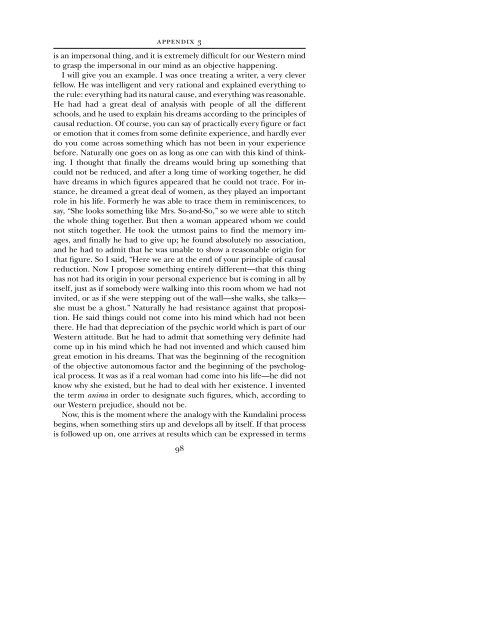CG JUNG - Countryside Anarchist
CG JUNG - Countryside Anarchist
CG JUNG - Countryside Anarchist
You also want an ePaper? Increase the reach of your titles
YUMPU automatically turns print PDFs into web optimized ePapers that Google loves.
APPENDIX 3<br />
is an impersonal thing, and it is extremely difficult for our Western mind<br />
to grasp the impersonal in our mind as an objective happening.<br />
I will give you an example. I was once treating a writer, a very clever<br />
fellow. He was intelligent and very rational and explained everything to<br />
the rule: everything had its natural cause, and everything was reasonable.<br />
He had had a great deal of analysis with people of all the different<br />
schools, and he used to explain his dreams according to the principles of<br />
causal reduction. Of course, you can say of practically every figure or fact<br />
or emotion that it comes from some definite experience, and hardly ever<br />
do you come across something which has not been in your experience<br />
before. Naturally one goes on as long as one can with this kind of thinking.<br />
I thought that finally the dreams would bring up something that<br />
could not be reduced, and after a long time of working together, he did<br />
have dreams in which figures appeared that he could not trace. For instance,<br />
he dreamed a great deal of women, as they played an important<br />
role in his life. Formerly he was able to trace them in reminiscences, to<br />
say, “She looks something like Mrs. So-and-So,” so we were able to stitch<br />
the whole thing together. But then a woman appeared whom we could<br />
not stitch together. He took the utmost pains to find the memory images,<br />
and finally he had to give up; he found absolutely no association,<br />
and he had to admit that he was unable to show a reasonable origin for<br />
that figure. So I said, “Here we are at the end of your principle of causal<br />
reduction. Now I propose something entirely different—that this thing<br />
has not had its origin in your personal experience but is coming in all by<br />
itself, just as if somebody were walking into this room whom we had not<br />
invited, or as if she were stepping out of the wall—she walks, she talks—<br />
she must be a ghost.” Naturally he had resistance against that proposition.<br />
He said things could not come into his mind which had not been<br />
there. He had that depreciation of the psychic world which is part of our<br />
Western attitude. But he had to admit that something very definite had<br />
come up in his mind which he had not invented and which caused him<br />
great emotion in his dreams. That was the beginning of the recognition<br />
of the objective autonomous factor and the beginning of the psychological<br />
process. It was as if a real woman had come into his life—he did not<br />
know why she existed, but he had to deal with her existence. I invented<br />
the term anima in order to designate such figures, which, according to<br />
our Western prejudice, should not be.<br />
Now, this is the moment where the analogy with the Kundalini process<br />
begins, when something stirs up and develops all by itself. If that process<br />
is followed up on, one arrives at results which can be expressed in terms<br />
98


